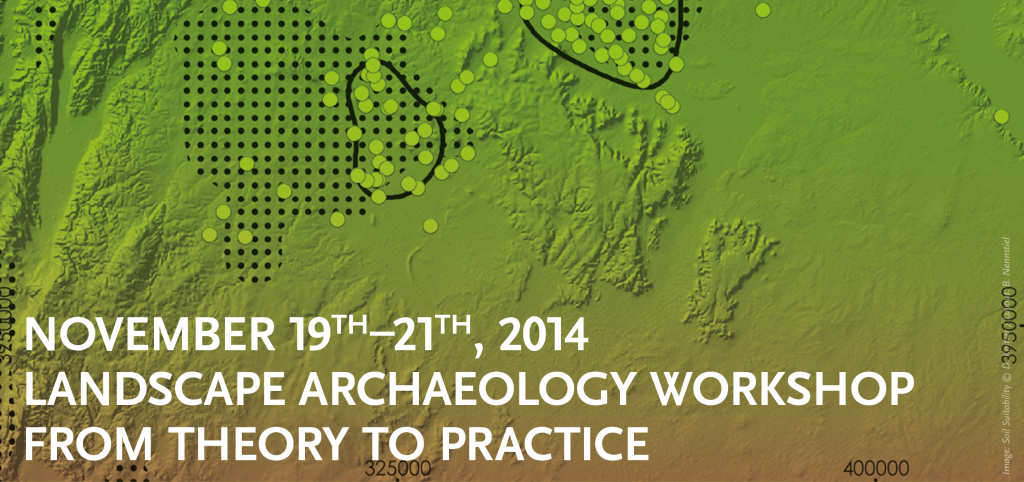
Today Landscape Archaeology is a well established discipline, in which different scientific approaches and methods are used. As landscape archaeology crosses the boundaries between sciences and humanities the beginning of a beneficial cooperation efforts mutual learning and adaption.
Therefore, dealing with landscape archaeological research is challenging in many ways:
a) One has to face all the problems that occur in an interdisciplinary research project. For instance: how to carry out interdisciplinary instead of multidisciplinary research? How to deal with the different, subject-specific definitions? Which theoretical concepts can be followed respectively applied?
b) In the last decades the term landscape was subject to controversial discussions in several disciplines. During the LAC 2010 in Amsterdam Thomas Meier criticized that the term “landscape’ functions as an envelope for nearly everything. But is this really the case? What are the topics and questions landscape archaeologists deal with? What is specific about these topics, hence about questions of landscape archaeological significance?
c) In modern understanding, the perception of a landscape is the result of our cultural construction and personal socialisation. Our way of life, with an easy access to maps and satellite images that help us to explore the world to a yet unknown extend, with the possibility to travel fast, safe and easily over huge distances and with a considerable food security determines how we perceive landscapes today. Thus our understanding and perception of landscapes must contrast strongly with that of prehistoric cultures.
How to overcome these problems? Which theories are helpful in this context and how can they be applied on real data?
During a 2.5 day workshop marked by keynote lectures, paper sessions, and open discussion rounds we would like to discuss these questions. The workshop therefore provides a platform for archaeologists, geographers and researchers from neighbouring disciplines dealing with these topics in landscape archaeology.
Therefore we would like to invite you to Berlin from the 19th to the 21th of November 2014 to give a talk on these topics and to discuss these issues together with us!
We hope to see you in Berlin in November!
Sincerely, The Organization Committee
Application
For further announcements and application please visit the blog of the Landscape Archaeology Workshop
INFORMATION & CONTACT
Tel.: +49.30.838-70239
Fax: +49.30.838-70755
E-Mail: landscapearchaeology@topoi.org
19.11.2014 | |
18:00 - 18:15 | Opening and welcome ceremony |
18:15 - 19:15 | Dialogues and analogues: an integrated holistic approach to ancient Egyptian landscapes and waterscapes Keynote Lecture Angus Graham |
19:15 - 20:15 | Welcome get together |
20.11.2014 | |
09:30 - 10:30 | Between “whole landscapes” and perspectives – the challenges of Landscape Archaeology Keynote Lecture Almut Schülke |
10:30 - 11:00 | Favour/disfavour? Marginal landscapes as natural and cultural space Jan Ahlrichs Thomas Knopf |
11:00 - 11:30 | Coffee break |
11:30 - 12:00 | From building archaeololectures and discussions will provide gy to the human settlement structure: an interdisciplinary study of Umm es-Surab (Jordan) Nicolò Pini |
12:00 - 12:30 | Local,regional,imperial: scales of analysis and the landscapes of the Sasanian Empire Dan Lawrence |
12:30 - 13:00 | Discussion |
13:00 - 14:30 | Lunch Break |
14:30 - 15:00 | Challenging landscapes Kristen Hopper |
15:00 - 15:30 | Islands in space and time: GIS, phenomenology and “communities of practice” Helen Dawson |
15:30 - 16:00 | The transformation of space and its interrelation with the construction of identities Nataliia Chub |
16:00 - 16:30 | Coffee Break |
16:30 - 17:30 | Discussion |
21.11.2014 | |
09:00 - 10:00 | Mind the gap: Integrating natural science with critical approaches from the social sciences and humanities Keynote Lecture Rebecca Lave |
10:00 - 10:30 | Combining urban and landscape archaeologies: the urban landscape of ancient Italy (350 to 300 BCE) Jamie Sewell |
10:30 - 11:00 | Coffee break |
11:00 - 11:30 | Big data for environmental archaeology: Is a new model really possible? Claudia Sciuto |
11:30 - 12:00 | Early agriculture, landscape, and social complexity in the central plains: human- environment interactions in the Zhengzhou Region during the early and middle Holocene Li Zhang |
12:00 - 12:30 | Use of space syntax visibility analysis for analysing construction phases of a pre-hispanic (400-1525) mound complex in Agua Buenas, Nicaragua Dita Auzina |
12:30 - 14:00 | Lunch Break |
14:00 - 15:00 | Final Discussion Sjoerd Kluiving |
